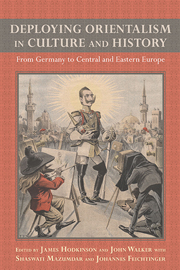Book contents
- Frontmatter
- Contents
- Preface
- Introduction
- 1 (Re)translating the West: Humboldt, Habermas, and Intercultural Dialogue
- 2 Friedrich Schlegel's Writings on India: Reimagining Germany as Europe's True Oriental Self
- 3 Germany's Local Orientalisms
- 4 Tales from the Oriental Borderlands: On the Making and Uses of Colonial Algiers in Germanophone Travel Writing from the Maghreb around 1840
- 5 The Jew, the Turk, and the Indian: Figurations of the Oriental in the German-Speaking World
- 6 M. C. Sprengel's Writings on India: A Disenchanted and Forgotten Orientalism of the Late Eighteenth Century
- 7 Occident and Orient in Narratives of Exile: The Case of Willy Haas's Indian Exile Writings
- 8 Distant Neighbors: Uses of Orientalism in the Late Nineteenth-Century Austro-Hungarian Empire
- 9 Modes of Orientalism in Hungarian Letters and Learning of the Nineteenth and Twentieth Centuries
- 10 Where the Orient Ends? Orientalism and Its Function for Imperial Rule in the Russian Empire
- 11 Noncolonial Orientalism? Czech Travel Writing on Africa and Asia around 1918
- 12 Oriental Sexuality and Its Uses in Nineteenth-Century Travelogues
- Notes on the Contributors
- Index
11 - Noncolonial Orientalism? Czech Travel Writing on Africa and Asia around 1918
Published online by Cambridge University Press: 05 December 2013
- Frontmatter
- Contents
- Preface
- Introduction
- 1 (Re)translating the West: Humboldt, Habermas, and Intercultural Dialogue
- 2 Friedrich Schlegel's Writings on India: Reimagining Germany as Europe's True Oriental Self
- 3 Germany's Local Orientalisms
- 4 Tales from the Oriental Borderlands: On the Making and Uses of Colonial Algiers in Germanophone Travel Writing from the Maghreb around 1840
- 5 The Jew, the Turk, and the Indian: Figurations of the Oriental in the German-Speaking World
- 6 M. C. Sprengel's Writings on India: A Disenchanted and Forgotten Orientalism of the Late Eighteenth Century
- 7 Occident and Orient in Narratives of Exile: The Case of Willy Haas's Indian Exile Writings
- 8 Distant Neighbors: Uses of Orientalism in the Late Nineteenth-Century Austro-Hungarian Empire
- 9 Modes of Orientalism in Hungarian Letters and Learning of the Nineteenth and Twentieth Centuries
- 10 Where the Orient Ends? Orientalism and Its Function for Imperial Rule in the Russian Empire
- 11 Noncolonial Orientalism? Czech Travel Writing on Africa and Asia around 1918
- 12 Oriental Sexuality and Its Uses in Nineteenth-Century Travelogues
- Notes on the Contributors
- Index
Summary
I. Introduction
When in 1927 the Czech Egyptologist Ludmila Matiegková (1889–1960) set out with fellow travel companions for Egypt to marvel at its ancient culture, she was confronted with her role as a tourist, a European, a woman, a scholar, and a Czech. Even though her published travelogue did not explicitly discuss her national identity or what it meant to be a Czech in Cairo, it still produced an implicit and ambivalent picture of Czech identity in a colonial setting: while Ludmila Matiegková painted a picture of the “magic of the Orient” that seems to reproduce general orientalist topoi, she distanced herself at the same time from those with whom she shared these figures of thought, namely, European colonial society in Egypt.
This ambivalent position, present in Czech travelogues from across the so-called Orient, will be at the center of this chapter as it discusses a form of orientalism that is not based on direct or explicit colonial interests or overseas possessions. It argues, rather, for a “noncolonial orientalism”: by concentrating on Czech travelers and their travelogues on the Orient in the five decades surrounding the end of the First World War and the founding of the Czechoslovak Republic in 1918, the chapter reconstructs a specific mode of “orientalizing” the Orient, which occurred outside of any direct colonial power relations.
- Type
- Chapter
- Information
- Deploying Orientalism in Culture and HistoryFrom Germany to Central and Eastern Europe, pp. 209 - 227Publisher: Boydell & BrewerPrint publication year: 2013



